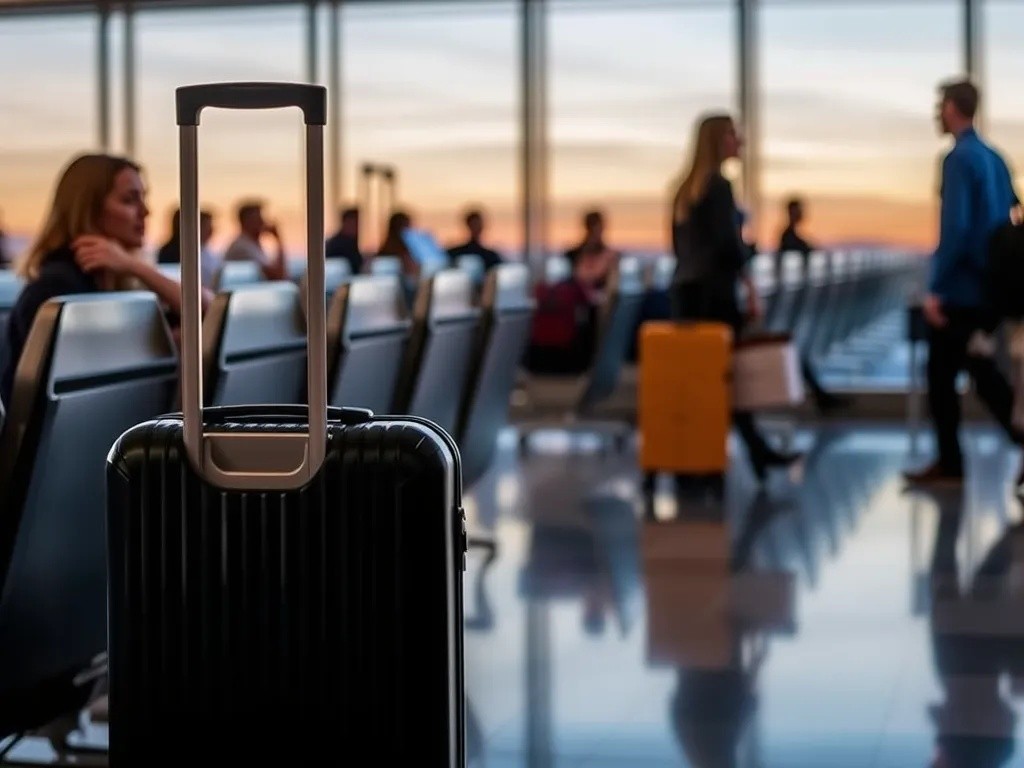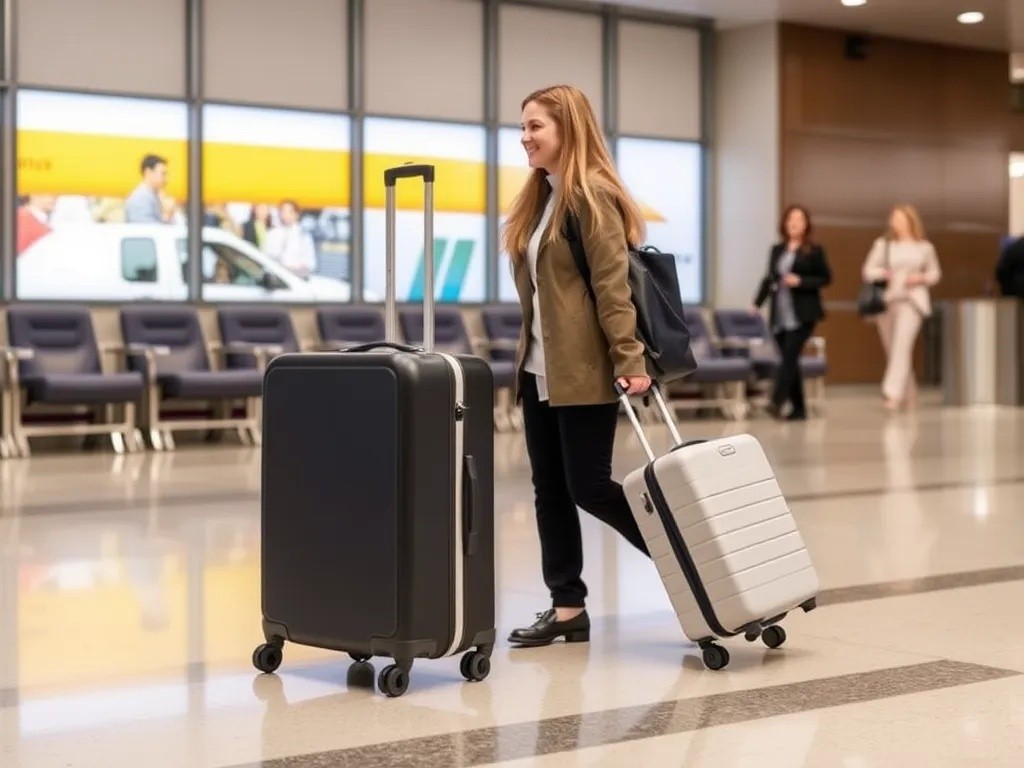Air travel has always been a mix of excitement and stress. While the destination promises adventure, the journey itself can be fraught with challenges—from navigating crowded airports to managing heavy bags and dealing with unexpected delays. Fortunately, technology has now entered the luggage space, giving birth to a new generation of smart suitcases designed to alleviate common travel pain points and transform the flying experience.
What Makes Luggage "Smart"?
Smart luggage represents the intersection of traditional baggage and cutting-edge technology. These innovative travel companions come equipped with a variety of features that address typical travel challenges. From battery packs that charge your devices to GPS tracking that prevents loss, smart luggage offers solutions that traditional suitcases simply cannot match.
The core attributes that elevate ordinary luggage to "smart" status typically include connectivity capabilities, power functionality, enhanced security features, and intelligent design improvements that streamline the travel experience from packing to destination.
Essential Smart Luggage Features
GPS Tracking and Bluetooth Connectivity
Perhaps the most valuable feature of smart luggage is location tracking. Lost bags are a traveler's nightmare, with approximately 24.8 million pieces of luggage mishandled by airlines annually. Smart suitcases combat this issue with embedded GPS chips and Bluetooth connectivity that allow travelers to track their bags in real-time through smartphone apps.
Advanced tracking systems can provide precise location information, including:
- Real-time GPS positioning within most major airports worldwide
- Proximity alerts when your luggage comes within Bluetooth range
- Last known location history if connection is temporarily lost
- Integration with airline tracking systems for seamless information sharing
This technology provides peace of mind, particularly for frequent travelers who often find themselves racing between tight connections or navigating unfamiliar terminals.

Built-in Scales
Excess baggage fees have become a significant revenue stream for airlines, with some carriers charging upwards of $100 for overweight bags. Smart luggage with integrated weighing systems helps travelers avoid these unexpected costs by providing accurate weight measurements before reaching the check-in counter.
The built-in scales typically operate in one of two ways:
- Handle-based sensors that measure weight when the bag is lifted
- Base-mounted pressure sensors that display weight when the bag is placed upright
Many smart luggage apps also store airline-specific baggage policies, alerting you when your bag exceeds the weight limit for your specific carrier and route.
Power Banks and USB Charging
Modern travelers rely heavily on electronic devices, from smartphones for boarding passes to tablets for in-flight entertainment. Smart luggage often includes removable power banks with multiple USB ports, allowing you to charge several devices simultaneously while on the move.
When selecting smart luggage with power capabilities, consider these factors:
- Battery capacity (measured in mAh) sufficient for multiple device charges
- Quick-access external ports that don't require opening the main compartment
- Easily removable power banks to comply with airline regulations
- Pass-through charging that allows the power bank to charge while it charges your devices
It's important to note that many airlines now require lithium batteries to be removed before check-in due to safety regulations, so look for designs where the power bank can be quickly detached.
Biometric Locks and Enhanced Security
Traditional combination locks can be forgotten or compromised, but smart luggage offers more sophisticated security options. Biometric locks using fingerprint recognition provide convenient, keyless security that only allows access to authorized users.
Beyond biometrics, advanced security features may include:
- Remote locking/unlocking via smartphone apps
- Unauthorized opening alerts sent directly to your phone
- TSA-approved electronic locks that allow security personnel to inspect bags without damaging them
- Anti-theft alarms that trigger when your bag moves beyond a set distance from your phone
These security enhancements not only protect your belongings but also provide real-time information about any tampering attempts.

Innovative Designs That Simplify Travel
Motorized Ride-On Options
Some premium smart luggage models feature motorized capabilities, transforming your suitcase into a personal transport device. These rideable options can reach speeds of up to 8 mph, making them ideal for quickly traversing large airports or transportation hubs.
While somewhat of a novelty, these motorized options offer practical benefits for travelers with mobility issues or those facing particularly long terminal walks. Many designs allow for both self-propelled movement (where you stand on the suitcase) and remote-control operation (where the bag follows you autonomously).
Expandable Compartments and Space Optimization
Smart design isn't limited to electronic features. Many smart luggage brands incorporate mechanical innovations that maximize packing space through:
- One-touch expandable compartments that increase capacity by up to 25%
- Compression systems that reduce clothing volume without wrinkling
- Modular dividers that adapt to different packing needs
- Built-in packing cubes with specialized compartments for different item types
These space-optimizing features help travelers pack more efficiently while keeping contents organized throughout the journey.
Practical Considerations Before Purchasing
Airline Compliance
Following several incidents involving lithium-ion batteries, many airlines and regulatory bodies have implemented restrictions on smart luggage. Before investing in a high-tech suitcase, consider these compliance factors:
- Battery removal capability is essential—most carriers prohibit smart luggage with non-removable batteries in checked baggage
- Battery size limitations typically restrict power banks to under 100Wh for carry-on use
- Some features may need to be disabled during flight (GPS transmitters, Bluetooth signals, etc.)
Always check your specific airline's smart luggage policy before traveling, as regulations continue to evolve with the technology.
Durability and Maintenance
Smart features add complexity to luggage, potentially creating more failure points. When evaluating durability, look for:
- Water-resistant materials that protect electronic components
- Reinforced corners and impact protection around technology elements
- Warranty coverage that specifically addresses electronic components
- Modular design that allows for component replacement rather than full luggage replacement
Consider the long-term maintenance requirements as well—some smart luggage requires regular firmware updates to maintain functionality.

The Future of Smart Travel
As technology continues to evolve, the next generation of smart luggage promises even more innovative features. Industry trends point toward increased integration with broader travel ecosystems, including:
- AI-powered packing assistants that suggest items based on your destination's weather and your itinerary
- Autonomous following capabilities using advanced computer vision
- Integration with smart airports for seamless check-in and baggage handling
- Sustainable power generation through movement or solar panels
The future of smart luggage aims to create a cohesive travel experience where your bag becomes an active travel companion rather than simply a container for your belongings.
Conclusion
Smart luggage represents a significant leap forward in travel convenience, addressing many of the common pain points that travelers face. From eliminating the anxiety of lost bags through GPS tracking to avoiding overweight fees with built-in scales, these high-tech travel companions offer practical solutions that enhance the overall flying experience.
While the added technology comes with considerations around airline compliance, maintenance, and cost, the benefits often outweigh these factors for frequent travelers. As we look toward a future of increasingly connected travel experiences, smart luggage stands at the forefront of innovations that are making the journey as enjoyable as the destination.
